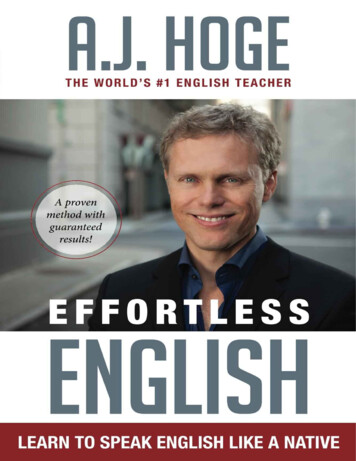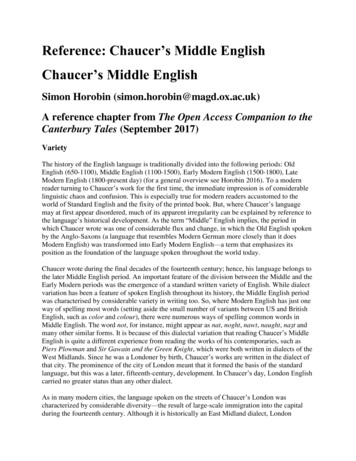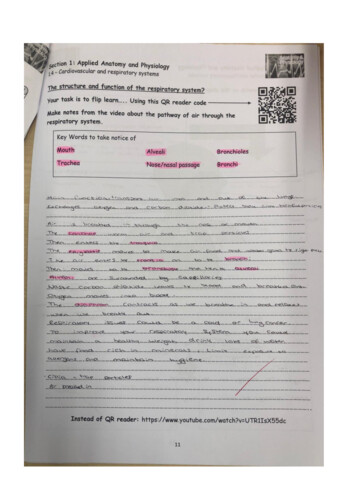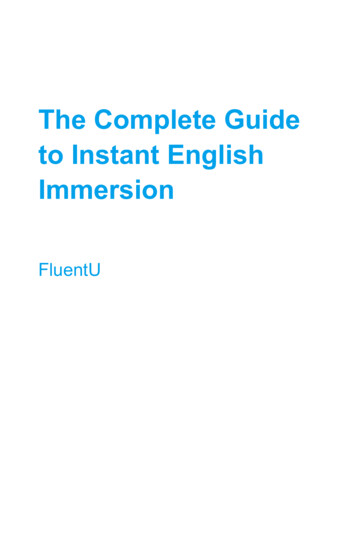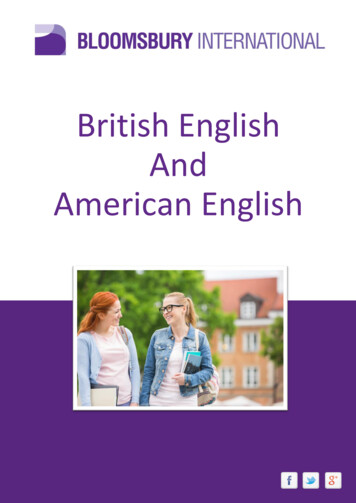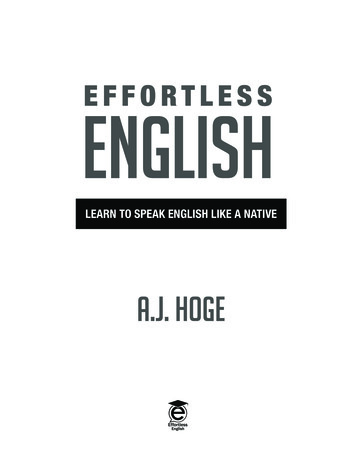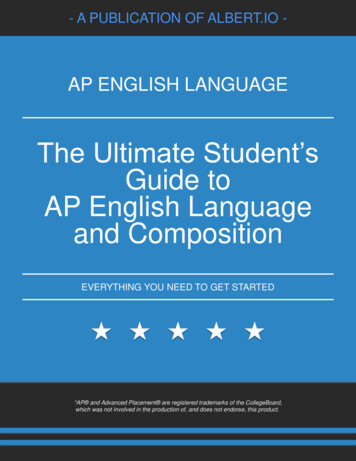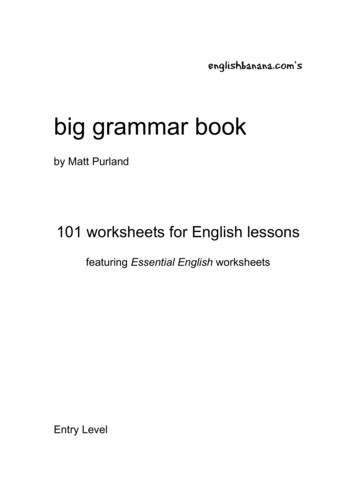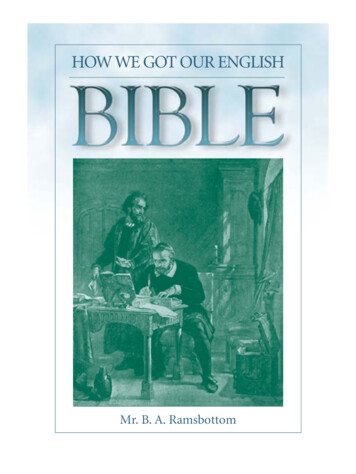
Transcription
How We Got our English Bible:How We Got our English Bible24/01/200714:22HOW WE GOT OUR ENGLISHMr. B. A. RamsbottomPage 1
How We Got our English Bible:How We Got our English Bible24/01/2007ISBN 978 1 86228 287 2 2007 Trinitarian Bible SocietyTyndale House, Dorset Road, London, SW19 3NN, UK5M/2/0714:22Page 2
How We Got our English Bible:How We Got our English Bible24/01/200714:22HOW WE GOT OURENGLISHby Mr. B. A. RamsbottomPastor at Bethel Strict Baptist Chapel, Luton,Bedfordshire, England, andEditor of the Gospel Standard MagazineBased upon a children’s address given on13th June 2004 in remembrance of the400th anniversary of the decision to translatethe Authorised Version. The style and personalreferences of the address are left unchangedwherever possible, but some are adapted fora wider audience.Now then, I want you to listen verycarefully whilst I read to you the first threeverses in Genesis.in principio creavit Deus caelum et terramterra autem erat inanis et vacua et tenebraeerant superfaciem abyssi et spiritus Deiferebatur super aquasdixitque Deus fiat lux et facta est luxhis afternoon I want to speakespecially to our girls and boysThere is something wrong, isn’t there? Therebut also to our young peopleis something the matter. It is in a strangeand our olderlanguage. It is in a languageTheScriptorium,whereBiblesfriends. Right at thewe do not understand. If webeginning let me say what like the Vulgate would havehad been living in England abeen copied by hand.a wonderful, wonderfulthousand years ago, thatthing it is that God haswould have been the onlygiven us a holy Book. WeBible there was, and it washave it in our ownnot a very good one. It waslanguage; it can becalled the Vulgate. It was inunderstood; it sets forthLatin. What I have read tothe way of salvation, theyou just now is Latin. It wasway to heaven; and within Latin, and as many of youthe Holy Spirit’s help weknow, the Bible was writtencan understand it.in Hebrew and Greek. So theT1Page 1
How We Got our English Bible:How We Got our English BibleH O WW EG O TO U Ronly Bible in England was this Latintranslation. Hardly anybody couldunderstand Latin. There were not many ofthese Bibles even if they could. Even thepriests—the most outwardly religiouspeople—most of them could not understandLatin. So people in England just did notknow about God. They just did not knowthe way of salvation. It is said that many ofthe priests could not repeat the TenCommandments, or say where they werefound, and most of the priests did not knowwho it was that first taught the Lord’s Prayer.Sadly, the fact that there were so many priestsreflected great ignorance of the true Gospel.24/01/2007E N G L I S H14:22B I B L Emysterious superstitions. The other terriblething: there was a dreadful lot of wickednessand immorality.John WycliffeOver the years there had been odd bits andpieces where people had put some of theBible into English. Now in the 1300s a manSo there were two terrible things. One wasthat there was a dreadful lot of superstition.People just could not understand this Latin.They had never read the simple Biblenarratives that we know. So they werefascinated by all kinds of superstition. Downin Gloucestershire in southwest England youcould visit an abbey and they would showyou what they said was a vial filled with theblood of Christ. One of the most famousthings people went to see was a crucifix. Ifyou put a lot of money down, the face on itsmiled. If you did not put much moneydown, the face on it frowned. There was achurch in Reading, west of London, that hadlots of things people used to visit. They hadthe wing of an angel; they had the spearheadthat was used at the crucifixion; they had twopieces of the cross; they had one of MaryMagdalene’s bones; and they had James’shand—or so these things were supposed tobe. We could go on and on. Down inSomerset, in the southwest of England, was achurch which among other things claimed tohave a piece of bread from the first Lord’sSupper and also a piece of the manger inwhich Jesus was laid when He was born.Wycliffe sends out his Lollard preachersarmed with Biblesappeared in England, a very wonderfulman, a very godly man. His name was JohnWycliffe (c. 1330–1384). He was a verylearned man, one of the most learned menin England. Also, he was blessed with muchof the Spirit of God, and he saw throughthe evils of the day. And revealed to himwas the way of salvation through the LordJesus Christ. If any of you are ever up atAttleborough in the English Midlands,where I know quite a lot of you go, if youtake a little journey of about fifteenminutes through the Leicestershire countrylanes, you come to the small town ofLutterworth where Wycliffe was theminister and you can see the church wherehe preached. Wycliffe is known as themorning star of the Reformation.1 Now hisgreat desire was that the Bible shouldappear in English, so he with his helperstranslated it.People could not read the Bible. They did notknow what was in the Bible. They hardlyknew what the name of Jesus meant, so theywere fascinated by all these strange, weird,So we had a Bible in the 1300s in English,really for the first time. But there were just2Page 2
How We Got our English Bible:How We Got our English BibleH O WW EG O TO U Rone or twodifficulties! Onewas that printinghad not beeninvented, so theBible had to becopied out byhand and ittook about tenmonths tocopy out theBible. Actually,one or two ofthem are stillin existence. Ifyou boughtone, it wouldbe about 40in thosedays,A page from a Wycliffe Biblewhichwould bethe same as thousands in our days. It is saidthat one farmer offered a whole cartload ofhay if in return he could have one page ofWycliffe’s Bible.24/01/2007E N G L I S H14:22B I B L EVulgate had it ‘Mary, full of grace’. Ofcourse, it is the Lord Jesus full of grace, notMary. Wycliffe, having no other, translatedit as it stood. So you have the first EnglishBible, but it has mistakes in, it is veryexpensive, and there are not many of them.William TyndaleSo we wait about two hundred years whenGod raised up a young man down inGloucestershire named William Tyndale(1494–1536), and really I think WilliamTyndale was perhaps one of the greatestmen who ever lived. Tyndale had awonderful understanding of Hebrew andGreek, and he had an ambition. Lots ofyoung people have an ambition, somethingthey would like to do. This was hisambition: he said, ‘If God spares my life, eremany years I will take care that aploughboy shall know more of theScriptures than you do’.2 So he startedputting the Bible into English from theoriginal language texts.But there was another difficulty. Wycliffe’sBible was just a translation of this LatinVulgate, so it was a translation of atranslation. Wycliffe had not got theoriginal Greek and Hebrew. It was atranslation of a translation and there wereone or two bad mistakes in the Vulgatetranslation; and Wycliffe, as this was theonly thing he had, reproduced them.Where John the Baptist and the Lord Jesuspreached ‘Repent’, the need of repentancefor a sinner to be saved, the Vulgate hadtranslated it ‘Do penance’, the RomanCatholic ‘something you had to do’—tellyour rosary so many times, or go on apilgrimage to Rome. Wycliffe, havingnothing else, also translated into theEnglish ‘Do penance’. Another example,where the angel appeared to Mary and said‘Hail, thou that art highly favoured’, theTyndale undertakes the hazardous task oftranslation3Page 3
How We Got our English Bible:How We Got our English BibleH O WW EG O TO U R24/01/2007E N G L I S H14:22Page 4B I B L EBishop of London bought as many NewTestaments as he could and burnt them,but with the money that was paid for themsome more, better-produced NewTestaments were sent to England. I say NewTestaments, because Tyndale never lived totranslate the whole of the Bible intoEnglish—he only actually completed theNew Testament. But the Bibles thatfollowed, especially the Authorised Version,followed Tyndale probably ninety per centor more than ninety per cent in what hehad translated.3 So the Bible we have todayis very similar to what Tyndale produced.To hisamazementhe did notget any help.WhenWycliffetranslated hisBible, Bibletranslatingwas madeSample from Tyndale’s New illegal.Testament Anyone whoread theBible in English or sold such a Bible wasput to death. It was the same with Tyndale.He went to the Bishop of London andthought he would help him. The Bishop ofLondon tried to put him in prison. So inthe end Tyndale had to flee to theContinent where he lived and died. This iswhy I think Tyndale was one of the greatestgodly Englishmen. It is one thing likeWhitefield to stand up before thirtythousand people, but think of Tyndale in adamp, cold cellar from morning to night,working away translating the Bible intoEnglish, or in a dusty attic, and hardlybeing able to leave the house in case he wascaptured, which at last he was. They caughthim and strangled him and burnt him. Hehad travelled from country to country untilin the end he was martyred. I thinkperhaps England owes more to Tyndalethan anybody else. There is a statue of himon the embankment of the River Thamesin London.The Invention ofPrinting and the EnglishBibleAbout this time was a very wonderfulinvention, nothing whatsoever to do withreligion (although we certainly see theprovidence of God in it!) and that was theinvention of printing by Gutenberg inGermany. Gutenberg produced the firstBible that wasGutenberg and his movable typeprinted, in 1456.printing pressActually, it wasthe Latin Vulgate.The desire beganto spring up thatEngland mighthave its ownBible. By 1534Germany had itsown Bible inGerman; Lutherhad produced it.England wasbeginning to feelvery English andfelt that it shouldhave the Bible inEnglish.Tyndale was godly, he was accurate, he waslearned, and he was helped by the Spirit ofGod in translating the Greek NewTestament into English. But these NewTestaments were not allowed in England.They had to be smuggled into the country.Bales of cloth would come from Holland.In the middle would be some of theseTyndale New Testaments. In the end, the4
How We Got our English Bible:How We Got our English BibleH O WW EG O TO U R24/01/2007E N G L I S H14:22B I B L EReally, much of the Reformation inEngland came about through the peoplegathering together in the churcheswhenever they had a spare moment,someone climbing up to the chained Bible,reading it aloud, hundreds of peoplelistening, God the Spirit sealing it home ontheir hearts. On the Continent it wasindividual people—Luther, Zwingli, Calvin.But in England it was not so much anyperson, but the Bible.The king at the time was the famous HenryVIII. He was having trouble with the pope,and there was quite a complicated periodwith several different Bibles appearing. In1535, Coverdale’s Bible appeared. He wasnot really a translator himself. He usedTyndale, he used the Vulgate, he usedLuther, he used one or two others. This wasAnne Boleyn’s Bible. You remember poorAnne Boleyn, the wife of Henry VIII, whowas beheaded. She had her own Bible toread. Two years later there was Matthew’sBible. After Anne Boleyn’s death, Henry didnot like to use her Bible. And then in 1539was the Great Bible. That was really the first‘Authorised Version’.There were all these Bibles appearing. Oneof the more famous is the Breeches Bible.In one of the catalogues of second-handChristian books for sale I received a fewweeks ago, there was a Breeches Bible forsale, for 3,000. The Breeches Bible was thefamous 1560 Geneva Bible. Those who hadfled from England to Geneva produced it,and the Geneva Bible—the BreechesBible—was the favourite of the Reformers,the favourite of the Puritans, the favouriteof Shakespeare. If you study Shakespeare,when he quotes from the Bible, he quotesfrom the Geneva.King Henry VIII was always a bigotedRoman Catholic, but he quarrelled with thepope and decided hewas going to have aBible in every churchin England. So waspublished this GreatBible, which wasreally a combinationof all the others witha lot of Tyndale in it.This Great Bible was called that because ofits size. It was a very big Bible and theseBibles were chained in the churchesbecause people wanted to read the Word ofGod so much they would have borrowedthem if not stolen them. Not far fromwhere I lived, in the ancient church atMitton in the Ribble Valley in Lancashire,northwest England, there is one of thesechained Bibles still there with its chains.Why was it called the Breeches Bible?Where we have in our Bibles in Genesis 3.7that Adam and Eve ‘sewed fig leavestogether, and made themselves aprons’, theGeneva Bible has, they ‘sewed fig leavestogether, and made themselves breeches’.The Geneva was popular. It was very small,very cheap. It also had very, very strikingnotes, strongly Calvinistic, strongly antipopish.A Brief PauseThe Great Bible was the Bible which wasalso known as the Treacle Bible. A lot ofthese old Bibles were known by strangenames. This was called the Treacle Biblebecause the translation of Jeremiah 8.22, ‘Isthere no balm in Gilead; is there no physicianthere?’ was rendered ‘Is there no triacle inGilead; is there no physician there?’Let me pause here. Some of you have askedme a question over the years. First of all theBible, any Bible, had no chapters or verses.A Roman Catholic cardinal called Hugo in1250 divided the Bible into chapters, andwe still have those same chapters today. But5Page 5
How We Got our English Bible:How We Got our English BibleH O WW EG O TO U R24/01/2007E N G L I S H14:22B I B L EIn former days Hampton Court was one ofthe royal palaces. Buckingham Palace hadnot appeared then. The king met theseministers and the most important thingthey decided was that they would have justone version of the Bible which would bethe authentic one instead of these differentBibles which were still appearing—Coverdale’s, Matthew’s, the Great Bible, theGeneva, and various other ones. So the kingagreed and there was this royalappointment that there was going to be justone Bible in English.it had no verses until 1551 when anEnglishman, Sir Robert Stevens, divided thechapters into verses. We still have the sameverses today. The italics we have firstappeared in the Geneva Bible—theBreeches Bible—and the margin referencesdid not appear until we had the AuthorisedVersion.The Four HundredthAnniversaryI suppose you are saying, Whatever has thisto do with a four hundredth anniversary?Well, you have all heard of the famousQueen Elizabeth, the great Queen Elizabeth Iand the days of Sir Francis Drake, SirWalter Raleigh, the Spanish Armada and soon. When she died she had no children—she was never married—and King James VIof Scotland became King James I ofEngland. His being from Scotland, peoplethought they would get a lot of favoursfrom him and a petition was put beforehim. In the end, four hundred years ago in1604, the new king agreed to meet anumber of ministers at Hampton CourtPalace. I think many of you, if not most ofyou, have been there. I remember at onetime we had two or three of our SabbathSchool outings to Hampton Court Palace. Iremember some of our children getting lostin the well-known Hampton Court Maze,and I remember a lot of you who are nowolder going to see the Vine.The Learned MenNow what happened? Fifty-four of themost learned Hebrew and Greek scholars inEngland were chosen to do the translation,to prepare it. But they did not just startwith a blank page. They had Tyndale andthey relied heavily on Tyndale. You will findif you compare Tyndale and our Bible thatfrom 1604 they followed Tyndale very, veryclosely indeed. It was not until 1611 thatthis Bible appeared. In America they alwayscalled it the King James Bible. Most Biblesstill have a little piece right at the front, adedication of the Bible by the translators toKing James. In Great Britain we call it theAuthorised Version.One thing most people have neverunderstood, is that on the front page youwill find in all your Bibles, whether they are6Page 6
How We Got our English Bible:How We Got our English BibleH O WW EG O TO U Rbig or little, the words‘Appointed to be read inchurches’. Most people thinkthat this means that the kingauthorised it, it was permitted, itwas allowed to be read inchurches. But themeaning iscompletely different.It had to be preparedin such a way, it hadto be set out, it had tobe arranged, so that itwould be very easy, verysuitable to be read inchurches.Lancelot Andrewes, Fellow of24/01/2007E N G L I S H14:22B I B L Eany other book. So many of the expressionswe use continually, day by day, come fromthe Authorised Version of the Bible. Allkinds of people use them, ungodly people,atheists, but they are all from the Bible.Things like: a thorn in the flesh, the powersthat be, a fly in the ointment. Our Englishlanguage is very, very much moulded byour Bible.One of the sad things today is that insteadof people referring to the Bible as they didyears ago, as they still did when I was a boy,now there are all kinds of versions andmore and more coming out year by year.What is the fault with these new versions?Two things: It seems that first of all most ofthem are based on doubtful manuscripts;but secondly, many of the modern translators use what they call ‘dynamicequivalence’, which means they try to capture the thoughts behind the words ratherthan translating the words themselves. Ourversion of the Bible is a strict translation,word for word from the best manuscripts inkeeping with what was inspired by theSpirit of God.Pembroke College, Cambridge. One ofthe members of the Old Testamenttranslation Committee responsible forthe books of Genesis to 1 ChroniclesWell, you havethese fifty-fourvery learnedmen. Iunderstand that Hebrew is a dreadfullydifficult language. These fifty-four men weresome of the greatest Hebrew and Greekscholars our country has ever known. Theywere all different and had all kinds ofdifferent views, but every one of them wascompletely committed to the infallibility andinspiration of Scripture. They wanted toproduce an excellent version of the Bible.You remember that Queen Victoria wasonce asked by an African prince, ‘What isthe secret of England’s greatness?’ To hisThey were divided into six different groups.Two met in London at Westminster; two ofthem met in Cambridge; two of them met inOxford. So, in the end, after seven yearslaboriously comparing, re-comparing anddiscussing, our wonderful version of the Bibleappeared in 1611. For years up till recenttimes this was the Bible. Everyone thought ofit just as the Bible.The Bible an open book: pages from an original1611 edition of the Authorised Version, open at1 Samuel 24The Authorised VersionInterestingly, apart from anything to dowith religion, the Authorised Version hasfashioned our English language more than7Page 7
How We Got our English Bible:How We Got our English BibleH O WW EG O TO U Ramazement, shetook up a Bible,and it was theAuthorisedVersion, ofcourse. She said,‘This is the secretof England’sgreatness’.24/01/2007E N G L I S H14:22B I B L Ethat I may behold wondrous things out ofthy law’ (Psalm 119.18). Especially pray tofind salvation there, to find Christ there.A little girl was given a Bible once and shewrote at the front of it,‘Divine Instructor, gracious Lord,Be Thou for ever near;Teach me to love Thy sacred Word,And find the Saviour there.’‘Search the Scriptures’Now I pray that itmight be like thatwith our youngpeople and olderones, too, each ofus: may we ‘loveGod’s Holy Word,and find theSaviour there’.Now I would like you all to turn with me toJohn 5.39. These are the words of the LordJesus Christ: ‘Search the scriptures; for inthem ye think ye have eternal life: and theyare they which testify of me’. We arewonderfully favoured that we have a Bible inEnglish, accurate, a true representation ofGod’s revelation, and there we can read thewill, the purpose of God: why He createdthe world; who God is, Father, Son andHoly Ghost; what our need is as sinners;how we can escape hell, how we can get toheaven; there is a heaven; there is a hell;what is the way of salvation; why did theLord Jesus Christ come—all these things.Slightly edited and printed by kind permission.Originally published as ‘The Story of our Bible’in QR571, April to June 2005.Endnotes:1. While many people tend to think that theReformation started with Martin Luther, d’Aubignéand others afford that honour to John Wycliffe.D’Aubigné wrote of him, ‘Wycliffe is the greatest ofEnglish reformers: he was in truth the first reformerof Christendom’ (1.98); it was he who early soughtthe reform of the established church and pioneeredthe concept of Sola Scriptura. ‘“The morning star ofthe Reformation,” for so has Wycliffe been called,had appeared above the horizon, and its beamswere no more to be extinguished’ (1.100). (J.H.M.d’Aubigné, The Reformation in England, 2 vols.[London, England: Banner of Truth Trust, 1962]Now the Lord Jesus said, ‘Search thescriptures’. What a terrible thing it is if webelieve that this is God’s holy, inspired Wordand we do not read it! There are somepeople who will fight to the death for theBible, the Authorised Version being God’sholy, infallible Book, but they do not read it.There are some ungodly, militant self-styledProtestants who would fight, literally fight,that the Bible is God’s holy, infallible Word.But they do not read it; they do not want toread it.2. Tyndale’s words, spoken to a ‘celebrated divine’ of theRoman church, have been quoted in several differentforms since he spoke them, but the meaning is always thesame. This quotation is taken from d’Aubigné, 1.175.3. ‘Nine-tenths of the Authorised Version’s NewTestament is Tyndale’s. The same is true of the first halfof the Old Testament, which is as far as he was able to getbefore he was executed outside Brussels in 1536’ (DavidDaniell, William Tyndale: A Biography [New Haven, CT,USA: Yale University Press, 1994], p. 1).‘Search the scriptures’. I hope you read yourBible every morning or every night, or both.Read it slowly and pray that God will helpyou to understand it. ‘Open thou mine eyes,8Page 8
How We Got our English Bible:How We Got our English Bible24/01/200714:22The aims of the SocietyGTo publish and distribute the HolyScriptures throughout the world in manylanguages.GTo promote Bible translations which areaccurate and trustworthy, conforming to theHebrew Masoretic Text of the Old Testament,and the Greek Textus Receptus of the NewTestament, upon which texts the EnglishAuthorised Version is based.GTo be instrumental in bringing light andlife, through the Gospel of Christ, to thosewho are lost in sin and in the darkness offalse religion and unbelief.GTo uphold the doctrines of reformedChristianity, bearing witness to the equaland eternal deity of God the Father, God theSon and God the Holy Spirit, One God inthree Persons.GTo uphold the Bible as the inspired,inerrant Word of God.GFor the Glory of God and the increaseof His Kingdom through the circulationof Protestant or uncorrupted versions ofthe Word of God.For introductory literature and catalogue pleasewrite to the Society at the address below.Product Code: A119Trinitarian Bible SocietyTyndale House, Dorset Road,London, SW19 3NN, Englande-mail: esociety.orgISBN 978 1 86228 287 29 781862 282872Page 10
thousand years ago, that would have been the only Bible there was, and it was not a very good one. It was called the Vulgate. It was in Latin. What I have read to you just now is Latin. It was in Latin, and as many of you know, the Bible was written in Hebrew and Gre


